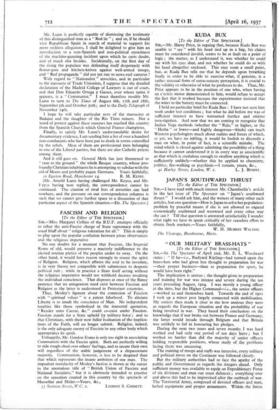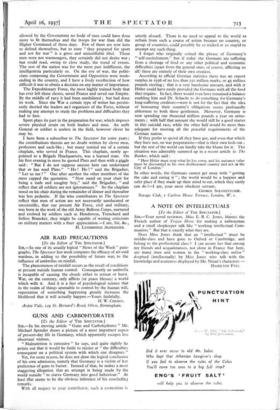" OUR MILITARY BRASS-HATS " [To the Editor of THE
SPECTATOR.]
SIR,—In The Spectator of April 2nd, Mr. E. L. Woodward states : " If he—i.e., Rudyard Kipling—had turned upon the brass-hats who had given less thought to preparation for war —their proper business—than to preparation for sport, he would have been right."
The implication is untrue ; the thought given to preparation and training for war was intense and severe during the ten years preceding August, 1914. I was merely a young officer at the time, but the Higher Command--i.e., the senior officers —worked us and themselves hard. Towards the end of 1911 I took up a minor post largely connected with mobilisation. My seniors then made it clear to me how anxious they were as regards the European situation and the probability of our being involved in war. They based their conclusions on the knowledge that if.war broke out between France and Germany, the latter would invade through Belgium and that Britain was unlikely to fail in honouring her pledges.
During the next two years and seven months I was hard worked and had only one period of ten days leave ; but I worked no harder than did the majority of senior officers holding responsible positions, whose study of the problems facing them was unceasing.
The training of troops and staffs was intensive, every military . and political move on the Continent was followed closely.
But the military authorities had to face the apathy of the public and Government as regards the dangers ahead. Only sufficient money was available to equip an Expeditionary Force of six divisions and man our coast defences ; everything over and above this had to be improvised after the mitt:weak of war. The Territorial Army, composed of devoted officers and men, lacked equipment and proper armaments. Within the limits
allowed by the Goverrunent no bod.3i of men could have done more to fit therapely,es and the troops for war than did the Higher Command of those days. Few of them are now here to defend themselves, but to. state " they prepared for sport and not for war " is a gross and unjustifiable libel. These men were not warmongers, they certainly did not desire war ; but could read, owing to close study, the trend of events. The rest of the nation was for the most part indifferent, the intelligentsia particularly so. On the eve of war, the politi- cians composing the Government and Opposition were week- ending in the country, and I have a lively recollection of how difficult it was to obtain a decision on any matter of importance.
The Expeditionary Force, the most highly trained body that has ever left these shores, saved France and saved our Empire. By the middle of 1915 it had been annihilated ; but had done its work. Since the War a certain type of writer has persist- ently decried the leaders an i organisers of the Force, without making any attempt to study the problems and difficulties they had to face.
Sport plays its part in the preparation for war, which imposes severe physical strain on both leaders and men. An unfit General or soldier is useless in the field, however clever he may be.
I have been a subscriber to The Spectator for some years; the contributions therein are no doubt written by clever men, professors and such-like ; but many remind me of a certain chaplain, who served in France. This chaplain, newly ap- pointed to a Brigade Headquarters, was a learned man. On his first evening in mess he quoted Plato and then with a giggle said : " But I do not suppose anyone here can understand that or has read Plato." " Ho ! Ho ! " said the Brigadier, " Let us see ! " One after another the other members of the mess capped the quotation. " Now stand on your chair for being a rude and naughty boy," said the Brigadier, " and reflect that all soldiers are not ignoramuses." So the chaplain stood on his chair during the remainder of dinner and thereafter was less pedantic. If the wise contributors to The Spectator reflect that .men of action are not necessarily uneducated or unscientific, that our present Air Force, civil and military, was born in the work of the old Army Balloon Corps, nurtured and evolved by soldiers such as Henderson, Trenchard and Sefton Brancker, they might be capable of writing criticisms on military matters with a finer appreciation.—I am, Sir, &c., H. LETHBRIDGE ALEXANDER.























































 Previous page
Previous page